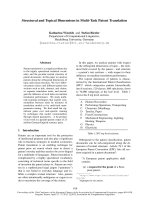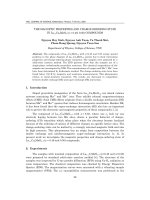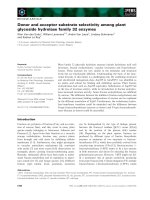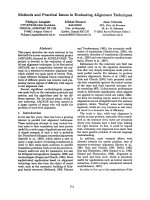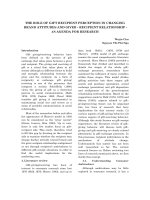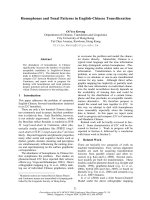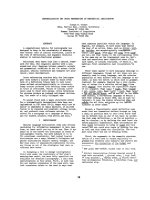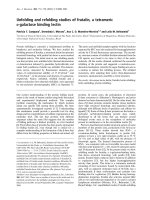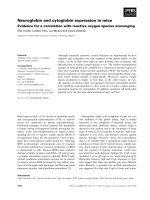Báo cáo " The magnetic properties and charge-ordering state in La1-xCaxMnO3 (x = 0.46; 0.50) compounds " doc
Bạn đang xem bản rút gọn của tài liệu. Xem và tải ngay bản đầy đủ của tài liệu tại đây (167.12 KB, 5 trang )
VNU. JOURNAL OF SCIENCE, Mathematics - Physics, T.xXI, n
0
1, 2005
26
The magnetic properties and charge-ordering state
in La
1-x
Ca
x
MnO
3
(x = 0.46; 0.50) compounds
Nguyen Huy Sinh, Nguyen Anh Tuan, Vu Thanh Mai,
Pham Hong Quang, Nguyen Tuan Son
Department of Physics, College of Science, VNU
Abstract. The compounds of La
1-x
Ca
x
MnO
3-
δ
with x=0.46 and 0.50 occupy special
positions in the phase diagram of La
1-x
Ca
x
MnO
3-
δ
system due to their interesting
properties and charge-ordering phase transition. The samples were prepared by a
solid-state reaction method. The XPD patterns show that the samples are of a
single-phase orthorhombic-perovskite structure. The chemical compositions of the
samples are investigated by EDS. The concentrations of oxygen and Mn
3+
; Mn
4+
ions
have been determined by dichromate method. The charge-ordering state have been
found below 150 K by magnetic and resistance measurements. This phenomenon
relates to metal-insulator transition. The results are discussed in competition
between double exchange (DE) and super-exchange (SE) interaction.
1. Introduction
Doped perovskite manganites of the form La
1-x
Ca
x
MnO
3-
δ
are mixed valence
systems containing Mn
3+
and Mn
4+
ions. They exhibit colossal magnetoresistance
effects (CMR). Such CMR effects originate from a double exchange mechanism (DE)
between Mn
3+
and Mn
4+
species that induces ferromagnetic correlation. Besides DE,
it has been found that the super-exchange interaction (SE) also has an important
role to govern the electronic and magnetic properties of these compounds [1, 2].
The compound of La
1-x
Ca
x
MnO
3-
δ
with x = 0.50, where one e
g
hole (or one
electron) hoping between two Mn sites, shows a peculiar behavior of charge-
ordering (CO) transition which takes place when the electrons become localized
because of the ordering of cations of different charges on specific lattice sites. The
charge-ordering state can be melted by a strongly external magnetic field and also
by high pressure. This phenomenon has an origin from competition between the
double exchange and antiferromagnetic super-exchange interaction [1, 3]. In
present work we investigate the magnetic properties and charge-ordering state of
La
1-x
Ca
x
MnO
3-
δ
(x = 0.46 and 0.50) compounds.
2. Experiments
The samples with nominal composition of La
1-x
C
x
MnO
3-
δ
(x=0.46 and x=0.50)
were prepared by standard solid-state reaction method [4]. The structure of the
samples was inspected by X-ray powder diffraction (XPD) using Cu-K
α
radiation at
room temperature. The chemical composition was checked by Energy Dispersive
Spectra (EDS). The magnetization curves were measured with a vibrating sample
magnetometer (VSM). The a.c susceptibility measurement was performed in the
The magnetic properties and charge-ordering state in…
27
range of temperatures from 70 K to 310 K. Resistance versus temperature curves
were measured on cooling from 300 K to 77 K without an external magnetic field by
four-point probe technique. The magnetocaloric effect measurement was performed
in a pulse field.
3. Results and Discussion
The XPD patterns of the La
1-x
Ca
x
MnO
3-
δ
(x=0.46; 0.50) samples indicate in
figure 1. It shows the single-phase orthorhombic perovskite structures. The
structure parameters of La
1-x
Ca
x
MnO
3-
δ
(x=0.46; 0.5) derived from XPD data
collected at room temperature are identified Pnma structure. The obtained lattice
parameters of the samples with x=0.46 and 0.50 are similar (different about some
parts of thousand angstroms, please see table 1). However, these values are smaller
than those of the undoped LaMnO
3
compounds, due to the fact that the radius of
Ca
2+
(0.99 Å) is smaller than that of La
3+
(1.016 Å) [3].
Figure 1a, 1b: XPD patterns of the La
1-x
Ca
x
MnO
3-
δ
samples (x = 0.46, 0.50).
Table 1: The lattice parameters of the samples La
1-x
Ca
x
MnO
3-
δ
with x = 0.46 and 0.50.
Lattice parameters
Sample
a (Å) b (Å) c (Å)
Volume of cell unit
(Å
3
)
La
0.54
Ca
0.46
MnO
3-
δ
5.457 5.466 7.799 232.628
La
0.50
Ca
0.50
MnO
3-
δ
5.453 5.461 7.801 232.304
LaMnO
3
5.532 5.742 7.728 244.500
Base on the oxygen deficiencies (δ) determined by dichromate method, the
contents of Mn
3+
, Mn
4+
ions and the ratios of Mn
3+
/Mn
4+
have been estimated and
showed in Tab. 2.
Table 2: Obtained oxygen deficiencies, determined contents of Mn
3+
, Mn
4+
ions and
Mn
3+
/Mn
4+
ratios.
Sample
δ
Mn
3+
Mn
4+
Mn
4+
/Mn
3+
La
0.54
Ca
0.46
MnO
3-
δ
La
0.50
Ca
0.50
MnO
3-
δ
0.0179
0.0184
0.5738
0.5368
0.4242
0.4632
0.7393
0.8629
Nguyen Huy Sinh, Nguyen Anh Tuan, Vu Thanh Mai…
28
Fig. 2a and 2b show the temperature dependences of magnetization for x=0.46
and 0.50, respectively, in both field cooled (FC) and zero-field cooled (ZFC) modes
under an external field of 200 Oe. Both field cooled (FC) and zero–field cooled (ZFC)
curves show a phase transition from the paramagnetic to ferromagnetic state at
Curie temperature T
C
=273 K for x=0.46 and T
C
=275 K for x=0.50. These values are
about 50 K higher than those obtained by other authors [5]. This feature is most
probably caused by the different sintering condition in sample preparation,
resulting a difference in actual content of Mn
3+
and Mn
4+
. According to Chen et al.
[6], the decreasing of La-content causes significant effects on enhancement of the
Curie temperature.
Fig. 3 shows the magnetization as a function of the applied field up to 5 T
measured at various temperatures around the Curie point for La
0.50
Ca
0.50
MnO
3-
δ
sample. From these curves with various temperature intervals, the magnetic
Figure 3: Isothermal magnetization
curves for the La
0.50
Ca
0.50
MnO
3-
δ
sample
measured up to 5T.
Figure 4: Entropy change as a function of
temperature for La
1-x
Ca
x
MnO
3-
δ
(x=0.50)
sample under field variations.
Figure 2a, 2b: Temperature dependences of magnetization for La
1-x
Ca
x
MnO
3-
δ
(x=0.46, 0.50), in both field cooled (FC) and zero-field cooled (ZFC) modes under an
external field of 200 Oe.
The magnetic properties and charge-ordering state in…
29
entropy change, ∆S
mag,
can be approximately calculated using isothermal
magnetization measurements [7]. Fig. 4 presents the magnetic entropy change as a
function of temperature for x=0.50 sample. We obtained a peak of magnetic entropy
change at T
C
. The maximum entropy change corresponding to a magnetic field
change of 5 T is 3.25 J/kg.K.
The charge ordering state is found in the temperature dependence of
magnetization. As we can see in Fig.5, this phenomenon coincides with the
observation of the jumps at T
CO
=156 K and 150 K on the a.c susceptibility versus
temperature plots for the x=0.46 and 0.50 samples, respectively.
Fig. 6 shows the temperature dependences of the resistance of the samples.
We can see clearly an abrupt drops at temperature of 156 K and 150 K for x=0.46
and 0.50, respectively, that should also relate to a charge ordering transition. Our
result is fairly consistent with the value of 160 K for La
0.50
Ca
0.50
MnO
3-
δ
obtained by
Radaelli et al. [8].
It has been shown that most of the CO states in Re
1-x
A
x
MnO
3
compounds have
a CE-type AFM order. In terms of the model proposed by Goodenough [9], Mn
3+
and
Mn
4+
are arranged like a checkerboard and Mn
3+
sites have a Jahn-Teller
distortion. The charge-ordering state will occur when this distortion becoming
stable. Furthermore, the exchange coupling between Mn
3+
and Mn
4+
ions depends
on the type of e
g
orbital occupied at the Mn
3+
site, leading to the following
charge/orbital pattern: along the a-axis, the same in-plane arrangement of Mn
3+
and Mn
4+
is stacked and the neighboured planes are antiferromagnetically coupled
via super-exchange interaction. On the other hand, charge-ordering phenomenon is
mutually exclusive with ferromagnetism in double-exchange (DE) mechanism,
which requires a charge-carrier hopping from Mn
3+
ion across an intervening O
2-
ion to an adjacent Mn
4+
. It is very intriguing that charge-ordering state coexists
with ferromagnetism in a narrow temperature region in La
0.5
Ca
0.5
MnO
3-
δ
, because it
is very useful for applications of the micro-technology nowadays.
Figure 5: A.c susceptibility versus
temperature plots for La
1-x
Ca
x
MnO
3-
δ
(x=0.46, 0.50) samples.
Figure 6: Temperature dependences of
the resistance for La
1-x
Ca
x
MnO
3-
δ
(x=0.46,
0.50) samples.
Nguyen Huy Sinh, Nguyen Anh Tuan, Vu Thanh Mai…
30
In conclusions, for present samples, the Mn
3+
/Mn
4+
ratio has been modulated
mainly by oxygen deficiency. It reveals that the large increase of Mn
4+
content plays
a crucial role in variations of magnetic properties of the samples. We found that the
charge-ordering state coexists with a antiferromagnetic state at temperatures
below 150 K. The competition between the double exchange (DE) and super-
exchange (SE) is believed to be responsible for this peculiar behavior. The observed
magnetocaloric effect in La
0.5
Ca
0.5
MnO
3-
δ
sample is remarkable at high magnetic
field variation.
Acknowledgements. The work at Hanoi National University was supported by
National Fundamental Research Program 421.104 and part of the Vietnam-Italia
Cooperation Project (2003-2005).
References
1. A.P. Ramiez and S. W. Cheong, Jour. Appl. Phys., 81(8) (1997) 5337.
2. H. Roder, J. Zhang, A. R. Bishop, Phys. Rev. Lett., 76(1996) 1356.
3. M.R. Ibarra and J.M. De Teresa, Colossal Magnetoresistance Charge Ordering
and Related Properties of Manganese Oxides. (C.N.R. Rao, World Scientific
Publishing, 1998), p. 147.
4. N.H. Sinh, N.P. Thuy, Jour. Magn. Magn. Mater., 262(2003), 502.
5. C.H. Chen and S-W. Cheong, Phys. Rev. Lett. 76(1996), 4042.
6. G.J Chen, Y.H. Chang and H.W. Hsu, Jour. Magn. Magn. Mater. 219(2000),
317.
7. Y. Sun, X. Xu, Y. Zhang, Jour. Magn. Magn. Mater. 219(2000), 183.
8. P.G. Radaelli, E.E. Cox, M. Marezio, S.W. Cheong, Phys. Rev. B 55(1997), 3015.
9. J.B. Goodenough, A. Wold, R.J. Arnoot and N. Menyuk, Phys. Rev. 124(1961),
373.
